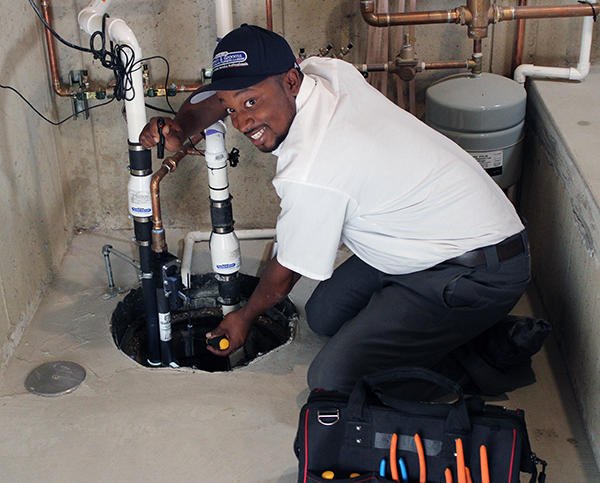Costs Water Softeners: Transforming Tough Water into Soft, Luxurious Convenience
Wiki Article
Understanding the Key Parts of Effective Water Filtering Solutions

Relevance of Water Purification Solution
Water filtering systems play an important function in guaranteeing access to secure and tidy alcohol consumption water by successfully eliminating contaminations and impurities. These systems are important in attending to the growing issues over water high quality and the potential wellness threats associated with eating contaminated water. By using various purification systems such as reverse osmosis, turned on carbon, and UV sterilization, water purification systems can effectively remove damaging substances like microorganisms, viruses, hefty steels, and chemicals from the supply of water.Moreover, water purification systems help to enhance the taste and odor of water by removing chlorine, sediments, and various other pollutants that can impact its quality. Well Pump Replacement. This enhancement in water high quality not just makes it much more palatable yet also encourages people to consume an adequate quantity of water daily, advertising better hydration and general health and wellness
Kinds of Purification Components

Physical filters are made to physically strain out pollutants from the water. These filters can be constructed from materials like ceramic, carbon, and even sand, and they function by capturing fragments larger than the filter's pores as water passes with.
Chemical filters utilize numerous chemical processes to remove pollutants from the water. Instances consist of triggered carbon filters, which adsorb contaminations, and turn around osmosis membrane layers, which use pressure to separate impurities from the water.
Organic filters make use of living organisms like algae or germs to damage down organic matter and contaminants in the water. These filters are usually made use of in wastewater therapy plants or all-natural water filtration systems.
Recognizing the various kinds of purification parts is crucial for selecting the most Homepage suitable water filtration system for specific purification demands.
Feature of Debris Filters
Debris filters play an important function in water purification systems by properly recording strong fragments put on hold in the water. These filters are normally the initial line of protection in a purification system, getting rid of bigger bits such as sand, silt, dirt, and rust before the water moves through finer filtration phases. By capturing these debris, the filters stop them from getting to downstream parts, therefore prolonging the lifespan and efficiency of the whole system.The feature of debris filters is essential in keeping water high quality and securing sensitive equipment from damages brought on by particles. Furthermore, by eliminating visible particles, debris filters boost the clearness and taste of the water. On a regular basis changing or cleansing debris filters is vital to make certain ideal performance. Neglecting this upkeep can bring about obstructing, minimized water flow, and endangered purification performance. Generally, sediment filters are essential parts that add substantially to the efficiency of water filtering systems.
Function of Activated Carbon Filters
Playing an important duty in water filtration systems, activated carbon filters are critical in getting rid of contaminations and contaminants from the water supply. As water passes with the filter, the activated carbon holds and attracts onto the pollutants, guaranteeing that the water that comes out on the various other side is cleaner and much safer for intake.Activated carbon filters are extremely effective at boosting the preference and smell of water by minimizing chemicals that can impact its quality. Due to their convenience and dependability, turned on carbon filters are a crucial component in making certain that water is cleansed to the highest requirements before getting to consumers.
Recognizing Reverse Osmosis Systems
Reverse osmosis systems are advanced water filtering systems that use a sophisticated process to remove impurities and contaminations from drinking water. Get More Information These systems work by using stress to the water, forcing it through a semi-permeable membrane.One trick advantage of reverse osmosis systems is their ability to eliminate a large range of contaminants, including heavy metals, dissolved solids, germs, and infections. This makes them very reliable in boosting the overall quality and security of drinking water. Furthermore, reverse osmosis systems are fairly low-maintenance and can be you can try these out set up under the sink or in a main filtering system, supplying hassle-free accessibility to tidy water throughout the family. Generally, recognizing exactly how reverse osmosis systems function can assist people make educated choices concerning their water purification requirements.
Final Thought
In final thought, effective water purification systems are critical for making sure risk-free and tidy alcohol consumption water. By understanding the feature and role of each part, individuals can make educated decisions when choosing a water filtration system.Water filtering systems play an important duty in guaranteeing accessibility to safe and tidy drinking water by successfully removing impurities and impurities. By utilizing different purification mechanisms such as reverse osmosis, triggered carbon, and UV sanitation, water filtration systems can effectively eliminate dangerous materials like bacteria, viruses, hefty steels, and chemicals from the water supply.
Sediment filters play a vital duty in water filtration systems by efficiently recording strong particles suspended in the water (Water Softeners).Playing a critical role in water filtration systems, activated carbon filters are critical in eliminating contaminations and pollutants from the water supply.Reverse osmosis systems are innovative water filtering systems that use a sophisticated process to remove contaminants and pollutants from drinking water
Report this wiki page